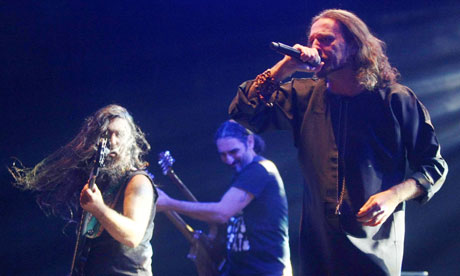
They are united by facial hair, frayed jeans and a love of heavy metal – plus a belief that music is above politics, religion and conflict. Now the Israeli band Orphaned Land is joining forces with the Palestinian group Khalas to take a message of coexistence through rock'n'roll across Europe.
An 18-gig tour will see the bands perform in six countries, including Britain, this autumn. The musicians will share both a stage and a tour bus for three weeks, proving in practice that their "metal brotherhood" overrides differences of religion and national identity.
At a concert to launch their European tour in Tel Aviv last week, Orphaned Land's lead singer, Kobi Farhi, and Khalas's lead guitarist, Abed Hathut, explained their mission.
"We can't change the world, but we can give an example of how coexistence is possible," said Farhi. "Sharing a stage and sharing a bus is stronger than a thousand words. We'll show how two people from different backgrounds who live in a conflict zone can perform together."
"We are metal brothers before everything," said Hathut. But, he added, "there is no bigger message for peace than through this tour".
Coexistence ventures may be new in the world of heavy metal, but precedent was set in the high-brow realm of classical music more than two decades ago, when Jewish conductor and pianist Daniel Barenboim and Palestinian intellectual Edward Said co-founded an orchestra of young Israeli, Palestinian and Arab musicians.
The members of Khalas, which is the supporting act on the tour, and Orphaned Land have "become soulmates" since meeting at a radio station and realising they have more in common than divided them, said Farhi. Last week's gig was their second performance together. But joint ventures between Jewish and Arab artists in Israel have in the past met with boycott calls from Palestinian activists, who argue that coexistence projects sanitise discrimination against Israel's 1.5 million Arab citizens and the state's military occupation of the Palestinian territories.
"I'm strongly against boycotts of any kind," said Farhi. "The purpose of art is to represent harmony in places of disharmony, to bring hope."
Hathut, from Acre in northern Israel, said Khalas – which means "enough" in Arabic – was a Palestinian band. "Just because we are Palestinians, people expect us to sing only about the occupation."
Orphaned Land, however, is overtly political. "Our music is never about an ex-girlfriend, it's always about politics," said Farhi. The lyrics to one of the band's most popular numbers, Disciples of the Sacred Oath, includes the line: "Shall we see the end of war, blood brothers? Or shall we fill another grave, for ourselves we couldn't save."
The heavy metal brothers hope this autumn's tour is just the start. "One day our children will form a band together," said Farhi.

